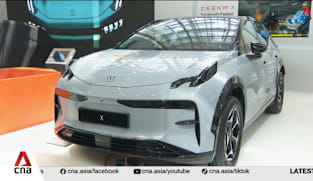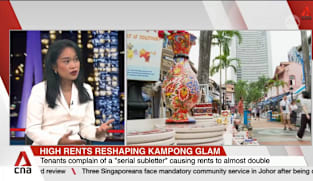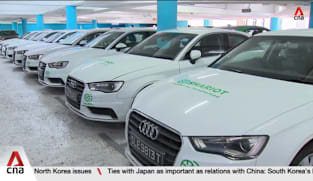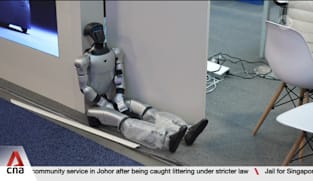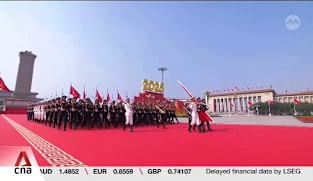Josephine Teo on Immigration (Amendment) Bill
Singapore’s immigration systems must be able to manage the high and growing volume of travellers efficiently and provide a positive clearance experience, while ensuring the country’s security, said Second Minister for Home Affairs Josephine Teo. As Singapore's population ages and its workforce shrinks, the Immigration and Checkpoints Authority (ICA) will have to cope without a significant increase in manpower, she said. The unabated security threats and pandemics like COVID-19 call for Singapore to go upstream in its immigration measures, she added. These include collecting advance passenger and crew information, and imposing entry restrictions on undesirable foreigners even before they arrive at the checkpoints. Outlining the key changes under the Immigration (Amendment) Bill in Parliament on Monday (Sep 18), she said the proposals are categorised along four broad objectives. They are to digitalise and automate immigration clearance, future-proof immigration systems and processes against new and evolving challenges, strengthen border controls and enhance the administration of immigration passes and permits. On digitalising and automating immigration clearance, automated clearance and the use of biometrics will be the new norm. To enhance the traveller experience at Changi Airport, the departure journey will be biometric-enabled, end-to-end, from the first half of 2024. Biometrics will be used to create a single token of authentication at various automated touchpoints - from bag-drop to immigration and boarding. This will reduce the need for passengers to repeatedly present their travel documents at these touchpoints. Mrs Teo said with the New Clearance Concept, ICA will make good use of data analytics and automation for more secure yet efficient immigration clearance of passengers and cargo. For travellers and businesses, there will be time and cost savings from smoother and faster clearance, and for the land checkpoints, reduced traffic congestion. The second category - future-proofing against new and evolving challenges - will involve the collection of advance passenger and crew information from transport operators to enable ICA to conduct more timely risk assessments and flag out undesirable travellers before they reach Singapore’s checkpoints. Currently, a transport operator of a vessel, aircraft or a train that arrives, leaves or is due to leave Singapore must furnish a list of passengers and a list of crew to an immigration officer. The amendments will enable ICA to also collect passenger and crew information from bus operators, as well as the particulars of persons travelling through the land checkpoints via other modes of land transport, such as cars, trucks or motorcycles, or on foot. ICA is engaging the relevant cross-border transport operators on the approach for the collection and submission of advance passenger and crew. Mrs Teo said the Bill will facilitate the implementation of more digitalised and automated services for the benefit of all travellers, as well as enhance Singapore’s immigration processes so that they are more robust, effective and efficient. “This is imperative for Singapore’s safety and security, and to maintain our status as a world-class transport hub and destination,” she said.
Singapore’s immigration systems must be able to manage the high and growing volume of travellers efficiently and provide a positive clearance experience, while ensuring the country’s security, said Second Minister for Home Affairs Josephine Teo. As Singapore's population ages and its workforce shrinks, the Immigration and Checkpoints Authority (ICA) will have to cope without a significant increase in manpower, she said. The unabated security threats and pandemics like COVID-19 call for Singapore to go upstream in its immigration measures, she added. These include collecting advance passenger and crew information, and imposing entry restrictions on undesirable foreigners even before they arrive at the checkpoints. Outlining the key changes under the Immigration (Amendment) Bill in Parliament on Monday (Sep 18), she said the proposals are categorised along four broad objectives. They are to digitalise and automate immigration clearance, future-proof immigration systems and processes against new and evolving challenges, strengthen border controls and enhance the administration of immigration passes and permits. On digitalising and automating immigration clearance, automated clearance and the use of biometrics will be the new norm. To enhance the traveller experience at Changi Airport, the departure journey will be biometric-enabled, end-to-end, from the first half of 2024. Biometrics will be used to create a single token of authentication at various automated touchpoints - from bag-drop to immigration and boarding. This will reduce the need for passengers to repeatedly present their travel documents at these touchpoints. Mrs Teo said with the New Clearance Concept, ICA will make good use of data analytics and automation for more secure yet efficient immigration clearance of passengers and cargo. For travellers and businesses, there will be time and cost savings from smoother and faster clearance, and for the land checkpoints, reduced traffic congestion. The second category - future-proofing against new and evolving challenges - will involve the collection of advance passenger and crew information from transport operators to enable ICA to conduct more timely risk assessments and flag out undesirable travellers before they reach Singapore’s checkpoints. Currently, a transport operator of a vessel, aircraft or a train that arrives, leaves or is due to leave Singapore must furnish a list of passengers and a list of crew to an immigration officer. The amendments will enable ICA to also collect passenger and crew information from bus operators, as well as the particulars of persons travelling through the land checkpoints via other modes of land transport, such as cars, trucks or motorcycles, or on foot. ICA is engaging the relevant cross-border transport operators on the approach for the collection and submission of advance passenger and crew. Mrs Teo said the Bill will facilitate the implementation of more digitalised and automated services for the benefit of all travellers, as well as enhance Singapore’s immigration processes so that they are more robust, effective and efficient. “This is imperative for Singapore’s safety and security, and to maintain our status as a world-class transport hub and destination,” she said.









